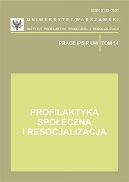Teoriopoznawcze przesłanki fenomenologicznych nastawień badawczych w Badaniach logicznych Edmunda Husserla
Theoretical and Cognitive Premises of Phenomenological Research in Edmund Husserl’s Logical Investigations
Author(s): Jarosław GaraSubject(s): Philosophy
Published by: Instytut Profilaktyki Społecznej i Resocjalizacji UW
Keywords: cognition; Edmund Husserl; experience; phenomenology
Summary/Abstract: The basic antinomic distinction articulated by Edmund Husserl in his Logische Unterschuchungen (Logical Investigations) is based on the opposition of the phenomenological notion of experience and empirical notion of experience, having been promoted by positivism. For Husserl, the basic point of reference in illustrating the phenomenological notion of experience are logical laws and logical dependencies. According to this distinction, the ideal objects (i.e. those of “higher rank”) should be opposed to the real ones (i.e. those of “lower rank”). In this sense, individual truths confirm the existence of actual isolated objects and are accidental. On the other hand, general (necessary) truths refer only and exclusively to the possible existence of such objects, therefore they are not conditioned by the concrete and isolated manifestation of a given thing. That is why the statements indicating empirical facts do not determine the epistemological premises of affirmation or negation of phenomenological statements.
Journal: Prace Instytutu Profilaktyki Społecznej i Resocjalizacji
- Issue Year: 2009
- Issue No: 14
- Page Range: 139-158
- Page Count: 20
- Language: Polish

